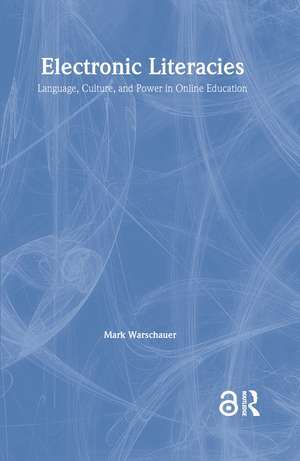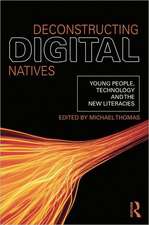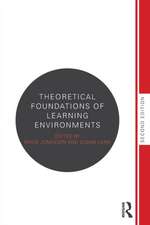Electronic Literacies: Language, Culture, and Power in Online Education
Autor Mark Warschaueren Limba Engleză Hardback – noi 1998
The role of the Internet in changing literacy and education has been a topic of much speculation, but very little concrete research. This book is one of the first attempts to document the role of the Internet and other new digital technologies in the development of language and literacy. Warschauer looks at how the nature of reading and writing is changing, and how those changes are being addressed in the classroom. His focus is on the experiences of culturally and linguistically diverse learners who are at special risk of being marginalized from the information society.
Based on a two-year ethnographic study of the uses of the Internet in four language and writing classrooms in the state of Hawai'i--a Hawaiian language class of Native Hawaiian students seeking to revitalize their language and culture; an ESL class of students from Pacific Island and Latin American countries; an ESL class of students from Asian countries; and an English composition class of working-class students from diverse ethnic backgrounds--the book includes data from interviews with students and teachers, classroom observations, and analysis of student texts. This rich ethnographic data is combined with theories from a broad range of disciplines to develop conclusions about the relationship of technology to language, literacy, education, and culture. Central to Warschauer's discussion and conclusions is how contradictions of language, culture, and class affect the impact of Internet-based education. While Hawai'i is a special place, the issues confronted here are similar in many ways to those that exist throughout the United States and many other countries: How to provide culturally and linguistically diverse students traditionally on the educational and technological margins with the literacies they need to fully participate in public, community, and economic life in the 21st century.
The Open Access version of this book, available at http://www.taylorfrancis.com, has been made available under a Creative Commons Attribution-Non Commercial-No Derivatives (CC-BY-NC-ND) 4.0 license.
| Toate formatele și edițiile | Preț | Express |
|---|---|---|
| Paperback (1) | 355.20 lei 6-8 săpt. | |
| Taylor & Francis – oct 1998 | 355.20 lei 6-8 săpt. | |
| Hardback (1) | 945.80 lei 6-8 săpt. | |
| Taylor & Francis – noi 1998 | 945.80 lei 6-8 săpt. |
Preț: 945.80 lei
Preț vechi: 1153.41 lei
-18% Nou
Puncte Express: 1419
Preț estimativ în valută:
181.00€ • 186.98$ • 150.64£
181.00€ • 186.98$ • 150.64£
Carte tipărită la comandă
Livrare economică 26 martie-09 aprilie
Preluare comenzi: 021 569.72.76
Specificații
ISBN-13: 9780805831184
ISBN-10: 0805831185
Pagini: 230
Dimensiuni: 152 x 229 x 20 mm
Greutate: 0.45 kg
Ediția:New.
Editura: Taylor & Francis
Colecția Routledge
Locul publicării:Oxford, United Kingdom
ISBN-10: 0805831185
Pagini: 230
Dimensiuni: 152 x 229 x 20 mm
Greutate: 0.45 kg
Ediția:New.
Editura: Taylor & Francis
Colecția Routledge
Locul publicării:Oxford, United Kingdom
Public țintă
ProfessionalCuprins
Contents: Preface. Introduction: Surveying the Terrain of Literacy. Computers, Composition, and Christianity. Networking Into Academic Discourse. Computer-Assisted Language Revitalization. Cyber Service Learning. Conclusion: Striving Toward Multiliteracies. Epilogue. Appendix: Researching the Online Classroom.
Recenzii
"Electronic Literacies is a timely book filled with important ethnographic data on technology and language education, including interviews with students and teachers, observation of classrooms, and transcripts of students' online interactions. It is one of the few attempts to explore the role of the Internet in the development of the language literacy of minority students, who have typically been overlooked in Internet-based education....This text is an excellent resource for teachers and administrators interested in understanding the effects of new technologies on language teaching and learning....the book is a valuable new addition to the field of technology and language teaching and learning."
—TESL-EJ
"Thankfully, Mark Warschauer's warts-and-all account of four very different university-level language learning classrooms in Hawai'i is not a one-eyed celebration of computers-in-classrooms but, rather, is a detailed and important account of four teachers' struggles with using new technologies to enhance their students' language learning....A real strength of Warchauer's book is the way in which he has drawn on theories of literacy and digital literacy from outside the domain of second language acquisition theory and conventional pedagogical approaches to computers and learning in second language classrooms. Indeed, Warschauer's breadth of sources is to be admired as he draws on work from educators and theorists in Australia, Canada, England, Hawai'i, and other U.S. states. Electronic Literacies will prove a rewarding launching pad for educators to think differently about literacy, language learning, and new technologies in the classroom. Warschauer deliberately and effectively locates his book as a complex intersection of the new literacy studies, digital technologies, and language education. Warschauer's book engages with current global themes in education--literacy, technology, equity--reminding educators that second-language teaching and learning is far from a neutral endeavor."
—Contemporary Psychology
"...a study like Mark Warschauer's Electronic Literacies is both timely and much needed....Electronic Literacies is a valuable contribution to research on teaching and learning with technology, in large part because Wauschauer resists either utopian or dystopian extremes; instead he patiently reveals the contradictions inherent in the combination of traditional academic approaches with new media. The book will be of special interest to graduate students and faculty interested in the design and presentation of qualitative research, who will find in Warschauer's data collection and analysis methods much that is worthy of imitation....a worthy addition to any collection of works on ESL, writing instruction, or the use of the Internet in higher education."
—The Journal of Highter Education
"I recommend the book to everyone interested in how new technologies are contributing to changes in the way literacy is viewed, as well as the those interested in researching teaching approaches using ICTs."
—Computers & Education
"Warschauer studies groups of students that have traditionally been excluded from computer-mediated education. This is vital if we are to truly understand the effects of new technologies....I believe this work will have a significant impact on the introduction and use of computer-mediated learning in higher education."
—Denise Murray
San Jose State University
"Warschauer's analysis is clear, informative, and insightful....A very useful and important book."
—Jim Cummins
Ontario Institute for Studies in Education
—TESL-EJ
"Thankfully, Mark Warschauer's warts-and-all account of four very different university-level language learning classrooms in Hawai'i is not a one-eyed celebration of computers-in-classrooms but, rather, is a detailed and important account of four teachers' struggles with using new technologies to enhance their students' language learning....A real strength of Warchauer's book is the way in which he has drawn on theories of literacy and digital literacy from outside the domain of second language acquisition theory and conventional pedagogical approaches to computers and learning in second language classrooms. Indeed, Warschauer's breadth of sources is to be admired as he draws on work from educators and theorists in Australia, Canada, England, Hawai'i, and other U.S. states. Electronic Literacies will prove a rewarding launching pad for educators to think differently about literacy, language learning, and new technologies in the classroom. Warschauer deliberately and effectively locates his book as a complex intersection of the new literacy studies, digital technologies, and language education. Warschauer's book engages with current global themes in education--literacy, technology, equity--reminding educators that second-language teaching and learning is far from a neutral endeavor."
—Contemporary Psychology
"...a study like Mark Warschauer's Electronic Literacies is both timely and much needed....Electronic Literacies is a valuable contribution to research on teaching and learning with technology, in large part because Wauschauer resists either utopian or dystopian extremes; instead he patiently reveals the contradictions inherent in the combination of traditional academic approaches with new media. The book will be of special interest to graduate students and faculty interested in the design and presentation of qualitative research, who will find in Warschauer's data collection and analysis methods much that is worthy of imitation....a worthy addition to any collection of works on ESL, writing instruction, or the use of the Internet in higher education."
—The Journal of Highter Education
"I recommend the book to everyone interested in how new technologies are contributing to changes in the way literacy is viewed, as well as the those interested in researching teaching approaches using ICTs."
—Computers & Education
"Warschauer studies groups of students that have traditionally been excluded from computer-mediated education. This is vital if we are to truly understand the effects of new technologies....I believe this work will have a significant impact on the introduction and use of computer-mediated learning in higher education."
—Denise Murray
San Jose State University
"Warschauer's analysis is clear, informative, and insightful....A very useful and important book."
—Jim Cummins
Ontario Institute for Studies in Education










